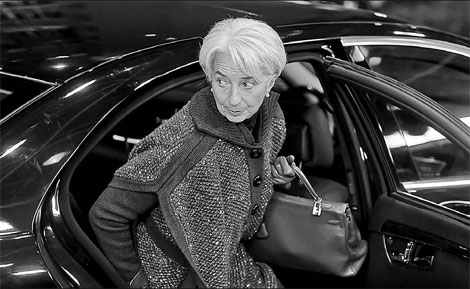EU to loan IMF $268 billion
Updated: 2011-12-12 07:57
By Sandrine Rastello (China Daily)
|
|||||||||
|
|
Europe wealthy enough to solve debt crisis on its own, says US' Barack Obama
WASHINGTON - In 2009, the United States led a global drive to increase the International Monetary Fund's firepower to help pull the world out of recession, pitching in $100 billion. This time, it's a bystander in a similar effort to counter the European debt crisis.
European leaders meeting in Brussels agreed to lend the IMF as much as 200 billion euros ($268 billion), opening the way for aid from nations such as Brazil and South Korea. While the US supports the effort, it won't participate, an administration official said in Washington.
Any solution to the crisis should be led by European nations themselves, not the IMF, to assure financial markets, said the official, who spoke to reporters on condition of anonymity. What's more, the administration of President Barack Obama would be unlikely to convince a Congress divided between Democrats and Republicans to approve money for the fund.
"Obama had a lot more political capital coming in 2009 when he was just elected," said Julie Chon, a former adviser at the Senate Banking Committee, which authorizes contributions to the IMF. "The crisis that's confronting the world today is a European-born crisis, so it requires European leadership, while in 2009 we were still fighting the remnants of a US subprime crisis."
"Europe is wealthy enough that there's no reason why they can't solve this problem," Obama said on Dec 8 at a White House news conference. "It's not as if we're talking about some impoverished country that doesn't have any resources."
The pledge by Europeans would provide temporary bilateral loans to the IMF to help it meet a potential increase in loan demand or a request from Spain and Italy for precautionary lending.
The agreement also raises the odds of help from the Group of 20 nations, which held back last month because they said Europe wasn't doing enough to help itself. The G20 comprises the world's leading industrial and developing economies accounting for about 85 percent of global gross domestic product. "We can contribute if some conditions are met," Sohn Byung Doo, director general of the G20 bureau at South Korea's finance ministry, said in a telephone interview.
China, whose foreign-exchange reserves of $3.2 trillion as of September were the world's biggest, reiterated its willingness to help, while stopping short of any indication of when it's prepared to announce an IMF contribution.
"China has been part of the international effort to counter the financial crisis and China will continue to be part of the effort, because we are interrelated, interdependent," said Fu Ying, vice-minister of Foreign Affairs, China. "We are in it together. We are in one boat.
"Europe needs a partner. They come to sell their bonds, that's a partnership," Fu, whose portfolio is European affairs, told reporters in Vienna on Saturday. "They have to work out the terms. It should be a kind of relationship of cooperation."
Stocks climbed on Friday, sending the Standard & Poor's 500 Index up for the week, Treasuries fell and the euro rose after Europe set plans to boost its rescue fund and tightened anti-deficit rules.
The S&P 500 climbed 1.7 percent to close at 1255.19 at 4 pm in New York. The euro increased 0.3 percent to $1.3375. Ten-year Treasury yields rose nine basis points to 2.07 percent. The 10-year Italian bond yield fell 10 basis points to 6.36 percent, reversing a 23-point increase.
Obama and Treasury Secretary Timothy F. Geithner, while refraining from committing cash, have pushed European leaders to resolve a crisis that threatens to derail the US economic recovery.
Geithner last week met European Central Bank President Mario Draghi, French President Nicolas Sarkozy, Italian Prime Minister Mario Monti and German Finance Minister Wolfgang Schaeuble during a three-nation visit to Europe to discuss possible solutions to the crisis. Geithner said he was "encouraged" by efforts by eurozone leaders although their work "will take time".
With Congress gridlocked on deficit-cutting measures, "the idea of voting to spend money helping advanced economies in Europe would be very difficult", said Phillip Swagel, a professor of international economic policy at the University of Maryland in College Park and a former assistant Treasury secretary. "We have so many problems at home, including reducing the fiscal deficit," he said.
Twenty-six Republican senators, including Jim DeMint of South Carolina and Tom Coburn of Oklahoma, introduced a bill on Friday to stop the IMF from using US taxpayer dollars to bail out euro-region countries. The bill also seeks to rescind the credit line the US gave in 2009.
Bloomberg News












